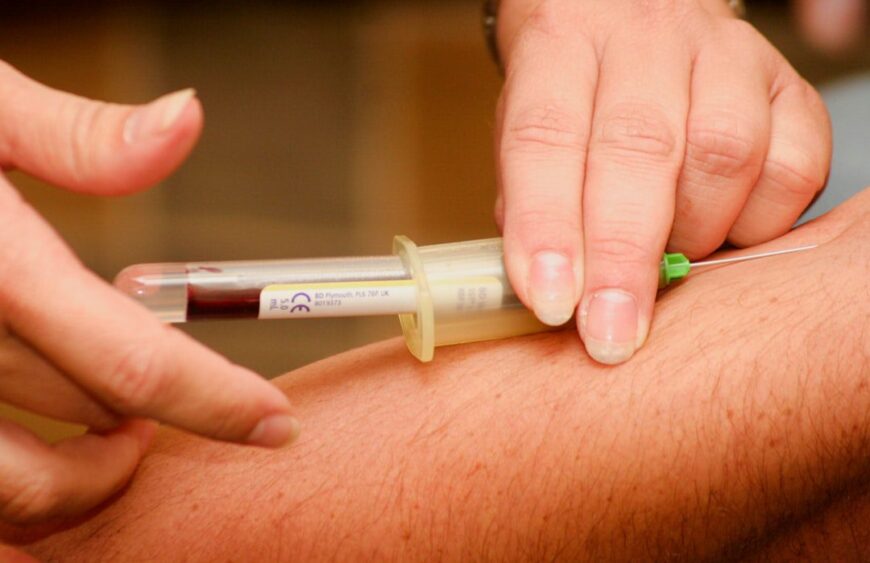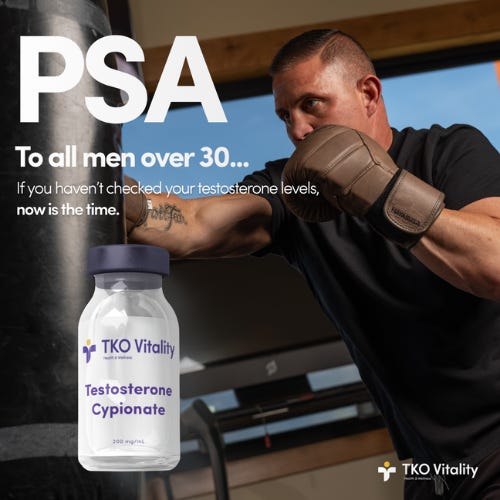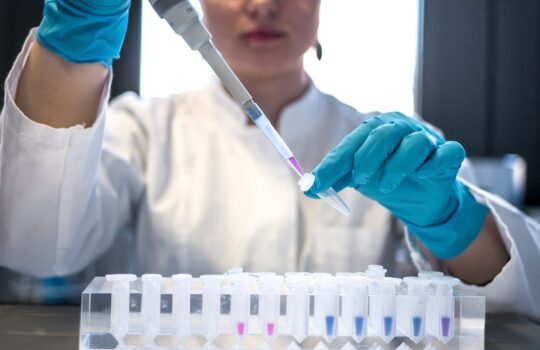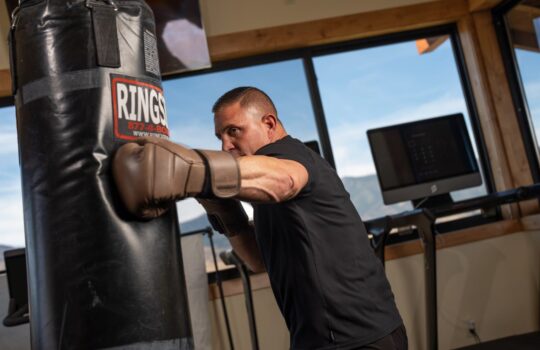What Blood Tests Are Needed for TRT?

Testosterone Replacement Therapy (TRT) boosts energy, muscle mass, libido, and mood in men with low testosterone, but requires careful monitoring to ensure safety and efficacy. Regular blood tests are essential to track hormone levels, detect side effects, and tailor treatment. At TKO Vitality, we provide comprehensive lab monitoring and personalized plans to maximize TRT benefits while minimizing risks.
Start your TRT journey with expert oversight for safe, effective results. Book your consultation today at TKOVitality.co/schedule.
Why Blood Tests Are Critical for TRT
TRT impacts multiple physiological systems, necessitating regular blood work to optimize testosterone levels and prevent complications like erythrocytosis or prostate issues. Studies emphasize monitoring key markers every 3–6 months initially, then annually (Bhasin et al., 2015). At TKO Vitality, our structured lab protocols ensure your therapy is safe and effective, tailored to your unique needs.
Key Blood Tests for TRT Monitoring
Testosterone Levels (Total and Free):
- Measures total (300–1000 ng/dL) and free testosterone to confirm therapeutic range and avoid supraphysiological levels (Bhasin et al., 2015).
- Tested every 3–6 months.
- TKO Vitality’s lab testing ensures precise dosing adjustments.
Hematocrit and Hemoglobin:
- TRT can elevate red blood cell production, increasing clot risk if hematocrit exceeds 54% (Cunningham et al., 2016).
- Monitored every 3–6 months to guide dose changes or interventions like phlebotomy.
- Our providers proactively manage erythrocytosis risks.
Prostate-Specific Antigen (PSA):
- Screens for prostate issues, as testosterone may stimulate tissue growth (Ramasamy et al., 2017).
- Baseline and periodic testing, especially for men over 40 or with family history; PSA >4 ng/mL requires evaluation.
- TKO Vitality includes PSA monitoring for comprehensive care.
Estradiol Levels:
- Testosterone aromatization to estradiol can cause gynecomastia or mood changes if elevated (20–50 pg/mL normal) (Carson & Manolagas, 2019).
- Tested routinely, especially with symptoms of estrogen excess, to guide aromatase inhibitor use.
- Our specialists balance hormonal profiles for optimal outcomes.
Lipid Profile:
- TRT may alter cholesterol (e.g., lower HDL, raise LDL), impacting cardiovascular risk (Traish, 2015).
- Full panel (total cholesterol, LDL, HDL, triglycerides) checked at baseline and annually.
- TKO Vitality’s metabolic assessments protect heart health.
Liver Function Tests:
- Modern TRT is low-risk for liver toxicity, but high doses may elevate enzymes (Jones et al., 2018).
- ALT and AST monitored at baseline and periodically, especially with symptoms like jaundice.
- Our protocols ensure safe therapy for all patients.
Blood Glucose and Insulin Sensitivity:
- TRT often improves glucose metabolism, but monitoring is key, especially for diabetic patients (Golds et al., 2017).
- Fasting glucose and HbA1c checked at baseline and annually.
- TKO Vitality optimizes metabolic health alongside TRT.
What to Know Before Starting TRT
Lifestyle Integration:
- Combine TRT with a balanced diet and regular exercise to enhance benefits (Traish, 2015).
- Address stress and sleep to support hormonal balance and therapy efficacy.
- Regular blood work ensures long-term safety and optimization.
Risks and Considerations:
- Elevated hematocrit, PSA, or estradiol may require dose adjustments or additional treatments (Cunningham et al., 2016).
- Monitor for cardiovascular or prostate risks, especially in older men or those with comorbidities.
- Long-term TRT requires consistent lab checks to maintain health.
Medical Supervision:
- TRT requires baseline labs (e.g., testosterone, PSA, lipid panel) and ongoing monitoring.
- TKO Vitality’s $86/week plan includes comprehensive lab testing and tailored protocols.
- Use FDA-approved sources for safe, effective therapy.
How TKO Vitality Supports Your TRT Journey
Get started with TKO Vitality:
- At-home or local lab testing to assess hormone levels and health markers.
- Video consultations with specialists to optimize TRT dosing and monitor side effects.
- Personalized protocols: lifestyle, medications, and lab schedules for 90% satisfaction rates within 12 weeks (clinic data).
- Ongoing support to ensure safe, effective therapy with minimal risks.
Ready to Optimize Your TRT?
If you’re experiencing:
- Low energy, reduced libido, or muscle loss due to low testosterone.
- Concerns about TRT safety or side effects.
- Desire for monitored, effective testosterone therapy.
Book a consultation at TKOVitality.co/schedule. Our evidence-based approach ensures safe, effective TRT with comprehensive blood monitoring.
Ready to Reclaim Your Vitality?
TRT is transformative; TKO Vitality provides the roadmap.
Does this sound like you?
- Struggling with Symptoms: Fatigue, low libido, or mood issues from low testosterone.
- Worried About Safety: Concerned about TRT side effects or health risks.
- Health Goals: Seeking energy, strength, and confidence.
Book a free 15-minute consult today at TKOVitality.co/schedule and discover how TRT with expert monitoring can transform your health.
Schedule Your Appointment

Don’t wait, low testosterone affects millions, and time’s running out to take control. Join thousands transforming their lives with TKO Vitality.
References:
- Bhasin, S., et al. (2015). Testosterone therapy in men with androgen deficiency syndromes: An Endocrine Society clinical practice guideline. The Journal of Clinical Endocrinology & Metabolism, 100(6), 2053–2065.
- Carson, J. A., & Manolagas, S. C. (2019). Effects of testosterone on muscle and bone in men. Nature Reviews Endocrinology, 15(7), 420–431.
- Cunningham, G. R., et al. (2016). Testosterone treatment and sexual function in older men with low testosterone levels. The New England Journal of Medicine, 374(7), 611–624.
- Golds, G., et al. (2017). Bone health and metabolic effects in men with hypogonadism: A systematic review. The Lancet Diabetes & Endocrinology, 5(9), 717–728.
- Jones, T. H., et al. (2018). Testosterone replacement therapy: Monitoring and management. Therapeutic Advances in Urology, 10(12), 375–385.
- Ramasamy, R., et al. (2017). Testosterone deficiency and prostate health: A review. Urology, 104, 1–7.
- Traish, A. M. (2015). Testosterone and obesity: A bidirectional relationship. Obesity Reviews, 16(8), 681–695.






